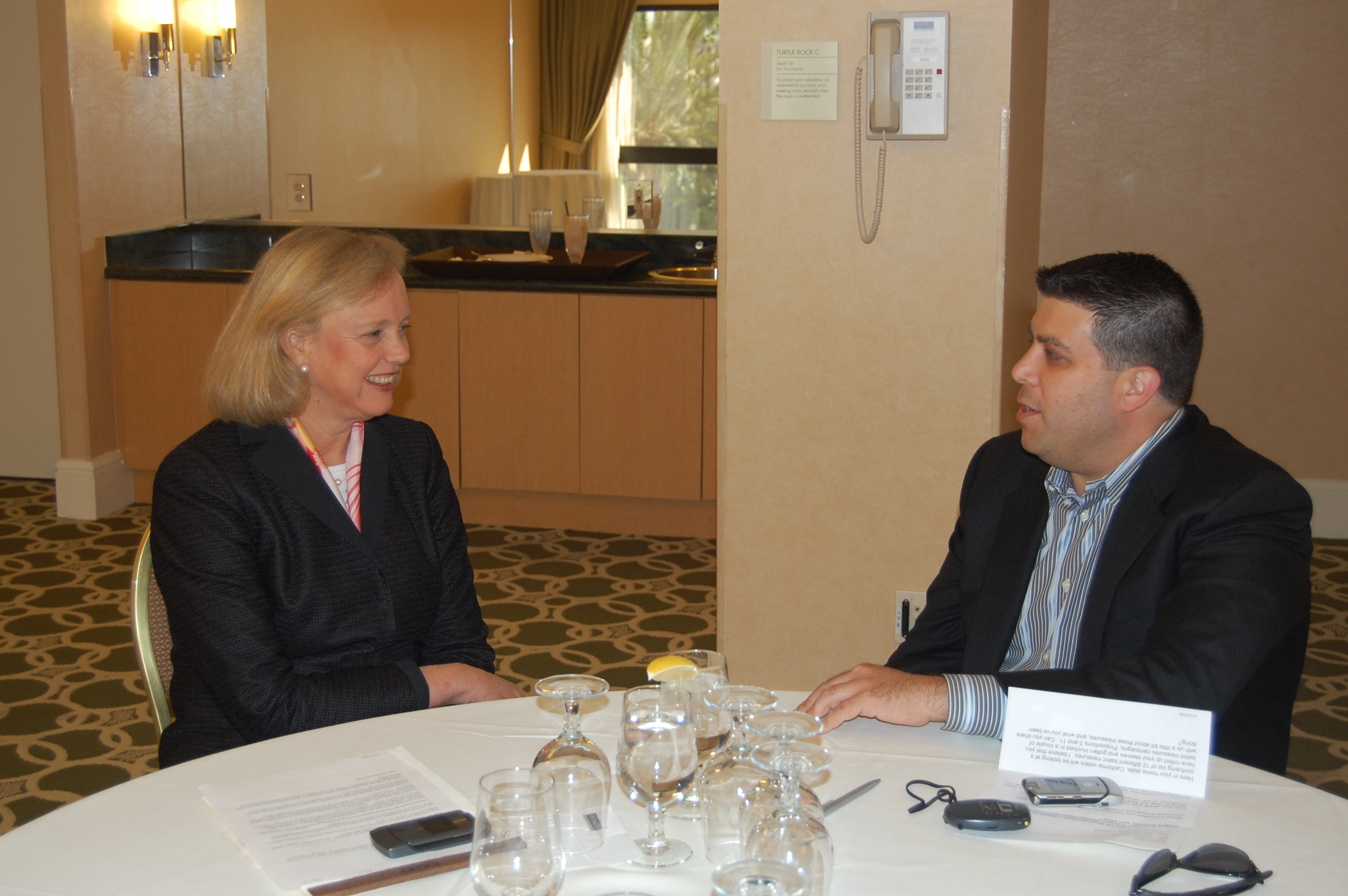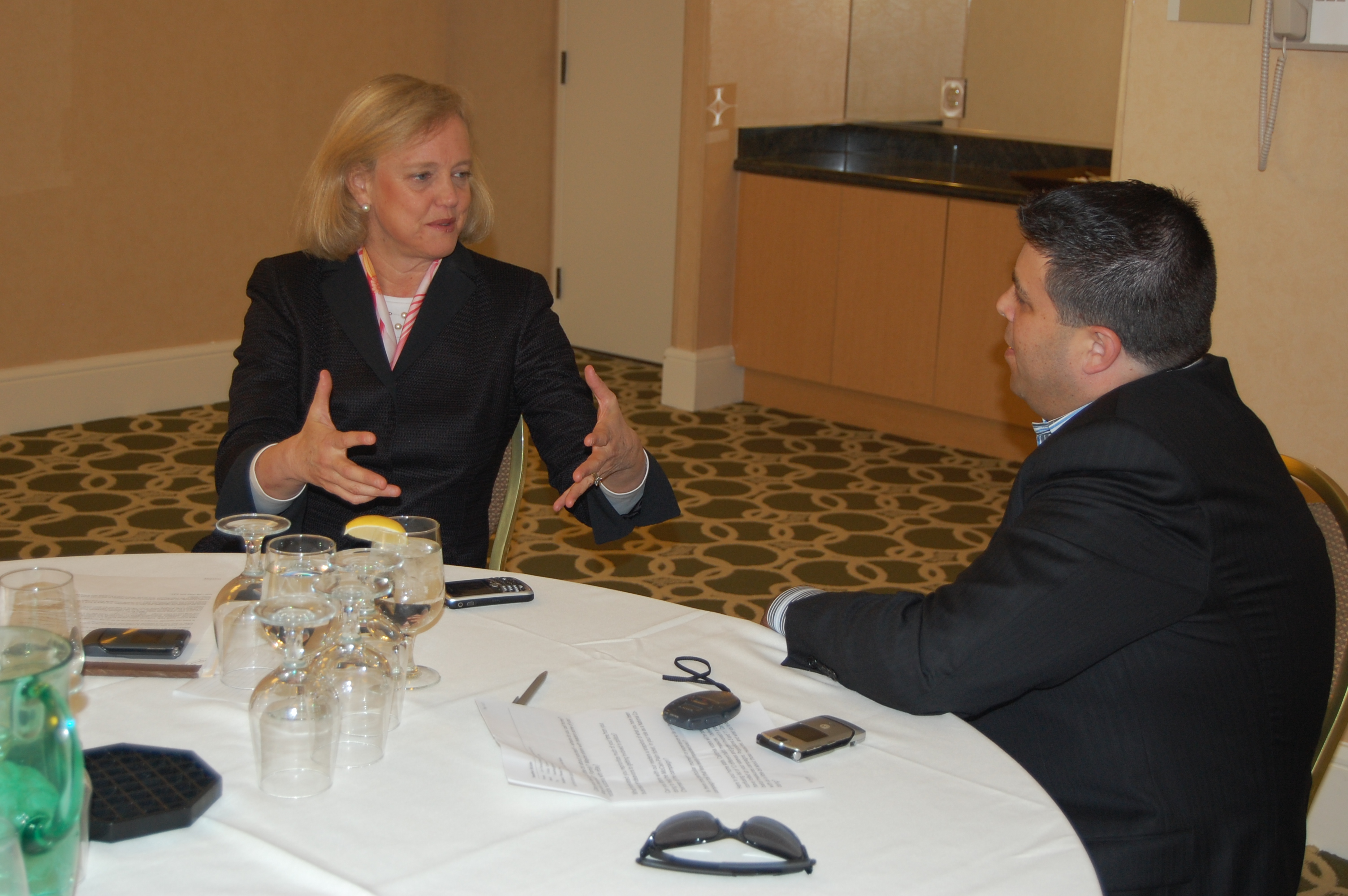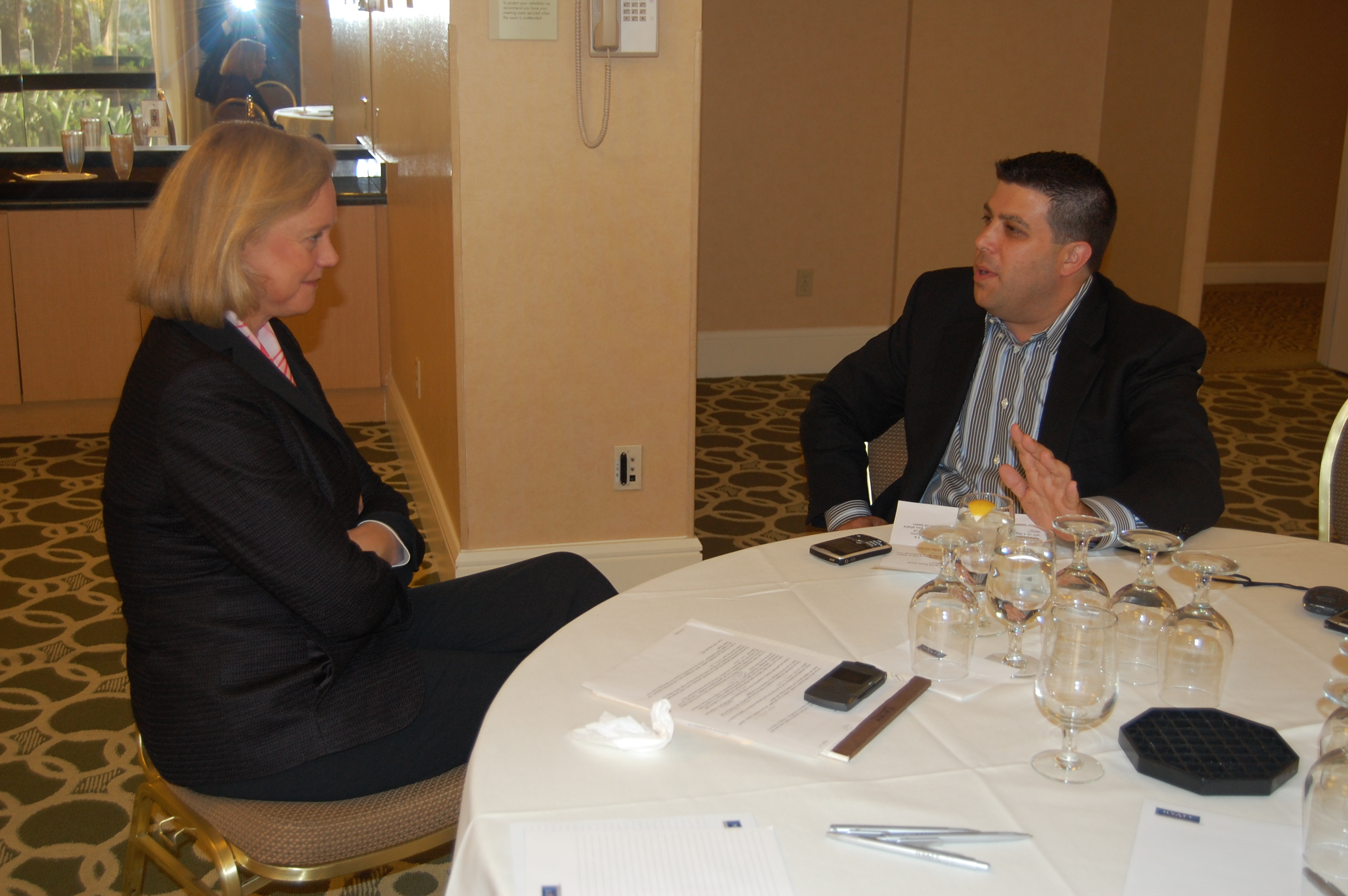A few days ago, I had an opportunity to sit down for about a half hour and conduct an interview with former eBay CEO Meg Whitman, a Californian, who is Co-Chairman of Senator McCain’s Presidential Campaign.
Whitman’s relatively recent arrival on the political scene has piqued the interest of many. Her success story at eBay, her net worth (rumored to be close to the billion dollar mark) and her high profile with the McCain campaign have made her quite the topic of discussion. Yet, still not much is known about Whitman’s politics.
Rather than substantially editing down the interview (which I typically do for interviews), I thought that it would be more enlightening this go-around to actually let you read the entire thing (there were some edits, but nothing major was omitted). As this is a fully transcribed interview, it runs long. Of course, our favorite part of the interview is at the very end — her kinds words about this website!

Jon Fleischman: Why don’t you tell us a little bit about yourself? Your background?
Meg Whitman: I was raised on north shore of Long Island in a little town called Cold Spring Harbor which is famous for the Cold Springs Lab where Watson and Crick did their early D.N.A. work [ed note: James Watson and Francis Crick discovered D.N.A.] and I went to public school K-12 and it was excellent science and math education because so many of the Cold Spring lab researcher’s kids were in the Cold Springs Harbor High School. Then went from there to Princeton as an economics major and then went right to Harvard Business School.
Fleischman: So one is out of school and one is still in?
Whitman: Actually one is senior – he took a year off and one is a sophomore. Both are at Princeton.
Fleischman: Ahh, the apple didn’t fall far from the tree!
Whitman: Then from there we moved around to different areas but since 1980, we’ve spent virtually all of our time in California with the exception of six years back in Boston. Today we live in Atherton, California, and Grif is a professor of neurosurgery and director of the brain tumor program at Stanford.
Fleischman: So Grif doesn’t have too bad of a commute?
Fleischman: Atherton is a beautiful community.
Whitman: Yes, it is.
Fleischman: Now, eBay. Tell us, when and how did you become a part of that? And what eBay was then and what it is today.
Whitman: We were living in Boston. We left California when I was working for Disney, and Grif had the chance to run the brain tumor program back at Harvard. So we moved back to Boston and I was working at Hasbro. I was running the pre-school division which is Barney, Arthur, the Teletubbies and Mr. Potatohead. Minding my own business, having a good time.
Fleischman: I have a one year old. Barney’s a big deal!
Whitman: Yes, he is! I got a call from a headhunter, who asked me to come out an interview for the job at eBay. And I said I’m not moving to California to work for a no-name internet company. Thank you! Three weeks later he called back and he said, “You know, you are perfect for eBay and eBay is perfect for you. Will you please interview?”
Fleischman: Millions of individual contractual relationships!
Whitman: Yeah. And make a small number of rules, enforce those rules, and then let the entire individual take advantage of those tools and build something that they loved. So even at the time, there were individuals making their living selling on eBay in categories they were passionate about. So if you loved toy trucks, you could sell toy trucks. If you loved consumer electronics, you could sell consumer electronics.
Fleischman: Right.

Fleischman: I know where those are!
Whitman: Into a two bed room apartment where – I love to tell this story – where the master bedroom walk-in closet was bigger than the second bedroom. So our 13-year-old lived in the master bedroom walk-in closet for a year.
Fleischman: And as a business person, trying to figure out how to create deadlines for people who just want to eat pizza and hang out in the conference room afterwards.
Fleischman: A pretty amazing story…
Whitman: I will say the thing that I’m proudest of about eBay is this empowering people to be successful and today there are 1.3 million people selling on eBay who make most, if not all of their living selling on eBay.
Fleischman: I know a few of them. So then what would have possessed you then to make such a – I won’t call it a shift, but to get motivated to get involved in politics?
One of the ways I got to know John McCain is he was one of the key senator who was against sales taxes on the Internet. His view was let this new medium flourish. Let’s not get government in the way of this. Let’s let the market forces take the internet wherever it would go. And that was a perfect example, by the way, of how government could help.
Alternatively, in Illinois in early 2000, there was a bill that making its way through the state legislature that was proposed by the land-based auctioneers in Illinois and they wanted to regulate our sellers as auctioneers and they wanted our sellers to pass the auctioneering test in Illinois, which included the voice test; you know, the 25, 25- 30, 35-40-45-50. And when my team came to me, I said, “Well, they understand this is a visual auction right? There is no voice”. They said, “Well, we’re not sure they understand it”, but what we were doing was pioneering a whole new form of commerce and the incumbents were threatened. And believe it or not, this piece of legislation made it all the way to the Senate floor of the State of Illinois and we had to unleash our community of users in Illinois, about 300,000, to end email into the inboxes of their state legislators. And it was killed, but that’s how close it came to government having a really negative impact on small business and eBay.
So that was number one. Number two, between taking eBay from a start-up to a grown-up, two teenage boys and a surgeon husband, I wasn’t looking for things to do, but my friend, Mitt Romney, called me in the fall of 2006 – and I had worked for Mitt for ten years. He was really my first boss. And he said ,”I’m thinking of running for President”. And it’s exciting when someone runs for President and means it. He said, “Would you help?” I said, “Mitt, I’d love to help”. I have a passion for his agenda for the country, and I said, “I’d love to help”. He said, “I want you to be a national finance co-chair”. I said, “Oh, okay”. I’m not sure, had I really understood what that meant, that I would have been so enthusiastic.
Fleischman: Right. Now I have to ask everyone I know and everyone I don’t know for money.
Whitman: Right. I mean, it got to the point where people would see my speed dial number come up and they wouldn’t answer. But I partnered with Tom Tellefsen in LA as two of the California co-chair. We were National Co-Chair, but we raised $12 million for Mitt out of California, and actually, $70 million for Mitt nationwide, which for a primary candidate was remarkable –
Fleischman: Sure.
Whitman: – and someone who has no brand name recognition.
Fleischman: If you had to think of one or two, something you think our readers might find interesting.
Whitman: I think that political campaigns, as you know better than I, are roller coasters, right? There’s highs and there’s lows. And John is very even-keeled, because when things are bad, he always remembers – and he has said to me on a number of occasions is, “Meg, the worst thing that could happen to me has happened to me”.

Fleischman: Well, he certainly successfully branded the convention because when I was in there –
Fleischman: Yes, it was Country First everywhere.
Whitman: And then before everything else, he does what’s right for the country. Right?
Whitman: I am passionate about Prop 11, having deeply understood some of the causes of gridlock in Sacramento and what I love about this initiative is I think it could be the first step in a series of reforms that makes Sacramento work better for the citizens of California. So this notion of having truly competitive district where a great sort of battle and ideas can make our state legislature more accountable to the people I think is a fantastic idea. And, of course, as you know, what happens today is that people are in safe districts. They don’t have an incentive to meet in the middle. They don’t have an incentive to get things done and you end up with this remarkably partisan bickering where we don’t get things done for the people of California. So I am very enthusiastic about this and delighted to step up in support of it.
Whitman: I did, yeah.
Fleischman: How much was that for?
Whitman: $200,000.
Whitman: Yeah. We have an account that we use for these kinds of things and we write a check.
Fleischman: That’s a transfer?
Whitman: No. We write a check. There’s actually a check.
Fleischman: So is that kind of a weird deal for you to sit there and write out a check for $200,000?
Whitman: Yes, or as Dianne Feinstein likes to call it, “The drug dealers express”, I guess.
Whitman: I have a passion for law enforcement. I think law enforcement and public safety officials have some of the toughest jobs in America and in California, and so when I understood what was behind Prop 5 – and I met with a number of district attorneys, a number of sheriffs – when I understood what it did and how it limited their degree of flexibility, and made – I mean, they basically said, “This will set us back twenty years in terms of law enforcement” as far as getting drug offenders under control in the State of California. So I said, “You know what? We have got to stand behind our law enforcement personnel and our public safety personnel”.
Whitman: So actually my first meeting was on this was with [Sacramento County District Attorney] Jan Scully in Sacramento and I said, “Gosh, I want to learn more about this, spend a bit of time this week learning more about it”.
Fleischman: Well, I know they are very appreciative for your large personal contribution, because it has been a tremendously difficult measure to raise money for.
Whitman: Well, thank you for that. I appreciate it. I was delighted to serve alongside Don Bren and Tony Russo from Team Cal and the California Republican Party to try to raise money for not only John McCain in California, but for Get Out The Vote, voter registration, all the down ticket candidates, as well. And so we did –
Whitman: Another check. Another check.
Fleischman: A lot more zeros.
Whitman: Yes, there was a check there, but probably the highest and best use of me was actually hosting these fundraising events. We did, I think, ten or eleven events up and down California where we invited people to come hear about the race, how we would use the money to Get Out The Vote, voter registration. And we raised a lot of money. We really had a good time and it felt like we were making progress. We raised more money, I think, than Team Cal has raised in some time, and I hope that will be a sustaining effort because that’s how we’re going to make the party stronger in California. That’s how we can raise money for up and down the ticket, for Senate races, for assembly races. So it was great fun and I am pleased that you guys were able to send some money to Colorado and Nevada because these are two states we must hold for John McCain.
Fleischman: Oh, absolutely.
Whitman: And in Nevada, I think the total Republican budget was about half a million dollars, and I forget exactly how much you [the California Republican Party, of which Jon Fleischman is an elected officer] sent but –
Whitman: You tripled the budget in Nevada, which is a huge –
Fleischman: We all worked together.
Whitman: We all worked together and it was a great team effort, and it was fun and it was a privilege to do it.
Fleischman: I guess to kind of finish up, just a couple of last questions. I guess first and foremost, coming back – the Presidential campaign is such a big deal and it’s such a night and day contrast between what we’re looking at after January 20th, but I don’t know if you have any final thoughts on the Presidential rates and anything you’d want to say to our readers about that.
Whitman: Well, I would just say what they know already which is this is potentially the most important presidential election that we’ve seen in our generation and the number one issue here is the economy. We’re in the middle of the worst economic crisis that we’ve seen since the Great Depression and this is about the future of the economy. Can we get the economy going? Can we become a job creation with our own innovation, and Senator Obama and Senator McCain’s views on this could not be more different.
And I subscribe to the theory that John McCain’s economic plan is far senior to Barak Obama’s because he want to not raise taxes. He wants to get government spending under control. He wants to invest in innovation and get us energy independent through a strategy not only of off-shore drilling, domestic resources, get us off foreign oil and all the new green technologies, and this is a very different strategy than raising taxes, all kinds of taxes. It’s not only income tax, but capital gains tax and a far more restrictive energy independence strategy.
So the choice, from my view, on the most important issue, which is the economy, could not be more stark and I have confidence that, actually, America, on November 4th, is going to defy the pundits one more time.
Fleischman: That’s great. We always like to end our interviews with my favorite question. Are you a reader of the Flash Report? Do you like what we do?
Whitman: Yes and yes.
Fleischman: What’s your favorite part about our website?
Fleischman: There it is. That’s perfect. Thank you for spending some time with us.
Pundits are saying that Meg Whitman may throw her hat into the ring for the GOP nomination for California Governor for 2010. While we didn’t talk about that with Whitman in this particular interview, you can be sure that we will be (obsessively) covering the 2010 primaries — and especially that one. First things first — we’ll see what the elections hold for tomorrow… For all we know, Whitman may end up in a McCain Administration…
Care to read comments, or make your own about today’s Daily Commentary?
Just click here to go to the FR Weblog, where this Commentary has its own blog post, and where you can read and make comments.

